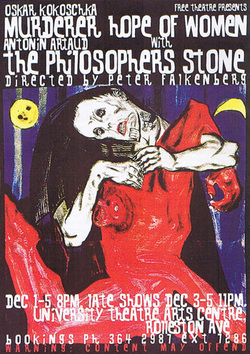Antonin Artaud - Letter to Commoedia (1932)

I conceive theatre as a magical operation or ceremony, and I shall strive to restore to it its primitive ritual character, by contemporary modern means, and as comprehensibly as possible to everyone.
But as theatre rediscovers powers of direct action on the nerves and sensibility, and through the sensibility on the spirit, it abandons the ways of spoken theatre, whose clarity and excessive logic are a hindrance to the sensibility. It is not a matter of suppressing words however, but of considerably reducing their use, or of using them in an incantatory way is forgotten or disregarded. Above all it is a matter of suppressing a certain purely psychological and naturalistic aspect of theatre, and allowing poetry and imagination to regain their rights.
A new language which will have its own laws and its own means of writing will develop beside spoken language, and however physical and concrete it may be, it will have as much intellectual importance and suggestive power as that other language.
For I believe it is urgent, for the theatre, to become aware once and for all of what distinguishes it from written literature. However transient it is, theatrical art is based on the use of space, on expression in space, and, speaking strictly, the fixed arts, inscribed in stone, on canvas or on paper, are not necessarily the most valid, nor the most efficacious magically.
In this new language, gestures have the value of words, attitudes have a profound symbolic sense, are grasped as hieroglyphs, and the whole spectacle, instead of aiming at effect and charm, will be a means of recognition, awe and revelation for the spirit.
As for the words, we shall not perform written plays. The shows will be created directly on the stage, and with all the means that the stage offers, but these means will be used as a language in the same way as the dialogues and words of the written theatre. This does not mean that the productions will not be rigorously shaped and fixed once and for all before being performed.
(back to Manifesto page)
But as theatre rediscovers powers of direct action on the nerves and sensibility, and through the sensibility on the spirit, it abandons the ways of spoken theatre, whose clarity and excessive logic are a hindrance to the sensibility. It is not a matter of suppressing words however, but of considerably reducing their use, or of using them in an incantatory way is forgotten or disregarded. Above all it is a matter of suppressing a certain purely psychological and naturalistic aspect of theatre, and allowing poetry and imagination to regain their rights.
A new language which will have its own laws and its own means of writing will develop beside spoken language, and however physical and concrete it may be, it will have as much intellectual importance and suggestive power as that other language.
For I believe it is urgent, for the theatre, to become aware once and for all of what distinguishes it from written literature. However transient it is, theatrical art is based on the use of space, on expression in space, and, speaking strictly, the fixed arts, inscribed in stone, on canvas or on paper, are not necessarily the most valid, nor the most efficacious magically.
In this new language, gestures have the value of words, attitudes have a profound symbolic sense, are grasped as hieroglyphs, and the whole spectacle, instead of aiming at effect and charm, will be a means of recognition, awe and revelation for the spirit.
As for the words, we shall not perform written plays. The shows will be created directly on the stage, and with all the means that the stage offers, but these means will be used as a language in the same way as the dialogues and words of the written theatre. This does not mean that the productions will not be rigorously shaped and fixed once and for all before being performed.
(back to Manifesto page)


